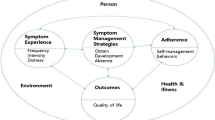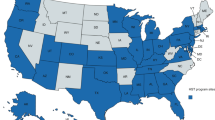Abstract
Hematological malignancies and treatment with hematopoietic SCT are known to affect patients’ quality of life. The problem profile and care needs of this patient group need clarification, however. This study aimed to assess distress, problems and care needs after allo- or auto-SCT, and to identify risk factors for distress, problems or care needs. In this cross-sectional study, patients treated with allo-SCT or auto-SCT for hematological malignancies completed the Distress Thermometer and Problem List. Three patient groups were created: 0–1, 1–2.5 and 2.5–5.5 years after transplantation. After allo-SCT, distress and the number of problems tended to be lower with longer follow-up. After auto-SCT, distress was highest at 1–2.5 year(s). Patients mainly reported physical problems, followed by cognitive-emotional and practical problems. A minority reported care needs. Risk factors for distress as well as problems after allo-SCT included younger age, shorter time after transplantation and GVHD. A risk factor for distress as well as problems after auto-SCT was the presence of comorbid diseases. Up to 5 years after auto-SCT or allo-SCT, patients continue to experience distress and problems. Judged by prevalence, physical problems are first priority in supportive care, followed by cognitive-emotional and practical problems.
This is a preview of subscription content, access via your institution
Access options
Subscribe to this journal
Receive 12 print issues and online access
$259.00 per year
only $21.58 per issue
Buy this article
- Purchase on Springer Link
- Instant access to full article PDF
Prices may be subject to local taxes which are calculated during checkout



Similar content being viewed by others
References
Lichtman MA . Battling the hematological malignancies: the 200 year’s war. Oncologist 2008; 13: 126–138.
van Eycken E, van de Schans S, Coebergh JW . Klinische epidemiologie van bloed- en lymfeklierkanker in Nederland en Vlaanderen. In: Löwenberg B, Ossenkoppele G, de Witte T, Boogaerts M (eds).. Handboek Hematologie. De Tijdstroom: Utrecht, The Netherlands, pp 289–312 2008.
Passweg JR, Baldomero H, Gratwohl A, Bregni M, Cesaro S, Dreger P et alfor the European Group for Blood and Marrow Transplantation (EBMT). The EBMT activity survey: 1990–2010. Bone Marrow Transplant 2012; 47: 906–923.
Mosher CE, Redd WH, Rini CM, Burkhalter JE, Duhamel KN . Physical, psychological, and social sequelae following hematopoietic stem cell transplantation: a review of the literature. Psycho-Oncology 2009; 18: 113–127.
Pidala J, Anasetti C, Jim H . Quality of life after allogeneic hematopoietic cell transplantation. Blood 2009; 114: 7–19.
Pidala J, Anasetti C, Jim H . Health-related quality of life following haematopoietic cell transplantation: patient education, evaluation and intervention. Br J Haematol 2010; 148: 373–385.
Syrjala KL, Langer SL, Abrams JR, Storer BE, Martin PJ . Late effects of hematopoietic cell transplantation among 10-year adult survivors compared with case-matched controls. J Clin Oncol 2005; 23: 6596–6606.
Syrjala KL, Yi JC, Artherholt SB, Stover AC, Abrams JR . Measuring musculoskeletal symptoms in cancer survivors who receive hematopoietic cell transplantation. J Cancer Surviv 2010; 4: 225–235.
Mosher CE, DuHamel KN, Rini C, Corner G, Lam J, Redd WH . Quality of life concerns and depression among hematopoietic stem cell transplant survivors. Support Care Cancer 2011; 19: 1357–1365.
Bevans MF, Mitchell SA, Marden S . The symptom experience in the first 100 days following allogeneic hematopoietic stem cell transplantation (HSCT). Support Care Cancer 2008; 16: 1243–1254.
Harrison JD, Young JM, Price MA, Butow PN, Solomon MJ . What are the unmet supportive care needs of people with cancer? A systematic review. Support Care Cancer 2009; 17: 1117–1128.
Li WWY, Lam WWT, Au AHY, Ye M, Law WL, Poon J et al. Interpreting differences in patterns of supportive care needs between patients with breast cancer and patients with colorectal cancer. Psycho-Oncology 2013; 22: 792–798.
Li J, Girgis A . Supportive care needs: are patients with lung cancer a neglected population? Psycho-Oncology 2006; 15: 509–516.
Molassiotis A, Wilson B, Blair S, Howe T, Cavet J . Unmet supportive care needs, psychological well-being and quality of life in patients living with multiple myeloma and their partners. Psycho-Oncology 2011; 20: 88–97.
Lobb EA, Joske D, Butow P, Kristjanson LJ, Cannell P, Cull G et al. When the safety net of treatment has been removed: patients’ unmet needs at the completion of treatment for haematological malignancies. Patient Educ Couns 2009; 77: 103–108.
Filipovich AH, Weisdorf D, Pavletic S, Socie G, Wingard JR, Lee SJ et al. National Institutes of Health consensus development project on criteria for clinical trials in chronic graft-versus-host disease: I. Diagnosis and staging working group report. Biol Blood Marrow Transplant 2005; 11: 945–956.
National Comprehensive Cancer Network I NCCN Clinical Practice Guidelines in Oncology—v.1.2002: Distress Management 2002 version 1.
Dutch Association of Comprehensive Cancer Centers (ACCC) Dutch Guideline Psychosocial Signaling. National Guideline 2010 version 1.0.
Roth AJ, Kornblith AB, Batel-Copel L, Peabody E, Scher HI, Holland JC . Rapid screening for psychologic distress in men with prostate carcinoma. Cancer 1998; 82: 1904–1908.
Ransom S, Jacobsen PB, Booth-Jones M . Validation of the Distress Thermometer with bone marrow transplant patients. Psycho-Oncology 2006; 15: 604–612.
Tuinman MA, Gazendam-Donofrio SM, Hoekstra-Weebers JEHM . Screening and referral for psychosocial distress in oncologic practice: use of the Distress Thermometer. Cancer 2008; 113: 870–878.
Jacobsen PB, Donovan KA, Trask PC, Fleishman SB, Zabora J, Baker F et al. Screening for psychologic distress in ambulatory cancer patients. Cancer 2005; 103: 1494–1502.
Bevans M, Wehrlen L, Prachenko O, Soeken K, Zabora J, Wallen GR . Distress screening in allogeneic hematopoietic stem cell (HCT) caregivers and patients. Psycho-Oncology 2011; 20: 615–622.
National Comprehensive Cancer Network. Distress management clinical practice guidelines. J Natl Comp Cancer Network 2003; 1: 344–374.
Gielissen MF, Schattenberg AV, Verhagen CA, Rinkes MJ, Bremmers ME, Bleijenberg G . Experience of severe fatigue in long-term survivors of stem cell transplantation. Bone Marrow Transplant 2007; 39: 595–603.
Hjermstad MJ, Knobel H, Brinch H, Fayers PM, Loge JH, Holte H et al. A prospective study of health-related quality of life, fatigue, anxiety and depression 3–5 years after stem cell transplantation. Bone Marrow Transplant 2004; 34: 257–266.
Manitta V, Zordan R, Cole-Sinclair M, Nandurkar H, Philip J . The symptom burden of patients with hematological malignancy: a cross-sectional observational study. J Pain Symptom Manage 2011; 42: 432–442.
Teunissen SCCM, Wesker W, Kruitwagen C, de Haes HCJM, Voest EE, de Graeff A . Symptom prevalence in patients with incurable cancer: a systematic review. J Pain Symptom Manage 2007; 34: 94–104.
Bonanno GA, Westphal M, Mancini AD . Resilience to loss and potential trauma. Annu Rev Clin Psychol 2011; 7: 511–535.
Dekker J, Beekman ATF, Boenink AD, Bomhof-Roordink H, Braamse AM, Collette EH et al. Comment on ‘Psychological distress in patients with cancer: is screening the effective solution? Br J Cancer 2013; 108: 2628–2630.
Wiskemann J, Huber G . Physical exercise as adjuvant therapy for patients undergoing hematopoietic stem cell transplantation. Bone Marrow Transplant 2008; 41: 321–329.
Fong DYT, Ho JWC, Hui BPH, Lee AM, Macfarlane DJ, Leung SSK et al. Physical activity for cancer survivors: meta-analysis of randomised controlled trials. BMJ 2012; 344: e70.
Ferguson RJ, Ahles TA, Saykin AJ, McDonald BC, Furstenberg CT, Cole BF et al. Cognitive-behavioral management of chemotherapy-related cognitive change. Psycho-Oncology 2007; 16: 772–777.
Yi JC, Syrjala KL . Sexuality after hematopoietic stem cell transplantation. Cancer J 2009; 15: 57–64.
Faller H, Schuler M, Richard M, Heckl U, Weis J, Küffner R . Effects of psycho-oncologic interventions on emotional distress and quality of life in adult patients with cancer: systematic review and meta-analysis. J Clin Oncol 2013; 31: 782–793.
Thygesen KH, Schjødt I, Jarden M . The impact of hematopoietic stem cell transplantation on sexuality: a systematic review of the literature. Bone Marrow Transplant 2012; 47: 716–724.
Author information
Authors and Affiliations
Corresponding author
Ethics declarations
Competing interests
The authors declare no conflict of interest.
Rights and permissions
About this article
Cite this article
Braamse, A., van Meijel, B., Visser, O. et al. Distress, problems and supportive care needs of patients treated with auto- or allo-SCT. Bone Marrow Transplant 49, 292–298 (2014). https://doi.org/10.1038/bmt.2013.155
Received:
Revised:
Accepted:
Published:
Issue Date:
DOI: https://doi.org/10.1038/bmt.2013.155
Keywords
This article is cited by
-
Patient-reported cognitive function among hematopoietic stem cell transplant and cellular therapy patients: a scoping review
Quality of Life Research (2023)
-
Clinical judgment of the need for professional mental health care in patients with cancer: a qualitative study among oncologists and nurses
Journal of Cancer Survivorship (2023)
-
Personalized versus standard cognitive behavioral therapy for fear of cancer recurrence, depressive symptoms or cancer-related fatigue in cancer survivors: study protocol of a randomized controlled trial (MATCH-study)
Trials (2021)
-
Screening supportive care needs, compliance with exercise program, quality of life, and anxiety level during the COVID-19 pandemic in individuals treated with hematopoietic stem cell transplantation
Supportive Care in Cancer (2021)
-
Predictors of the trajectory of cognitive functioning in the first 6 months after allogeneic hematopoietic stem cell transplantation
Bone Marrow Transplantation (2020)



